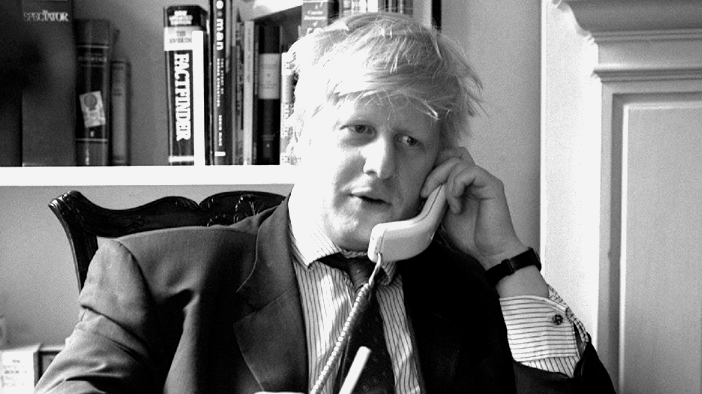If it’s true Boris Johnson defiantly ranted that it would take “a tank division” to get him out of Downing Street, a great many of his former Daily Telegraph colleagues can scarcely have been surprised.
In the 12 years I worked at the paper, I knew of a great many production staff – and even one or two editors – who would periodically complain about how late he was delivering his columns, the schoolboy errors they often contained and their myriad other shortcomings.
One editor had vainly attempted to sack him. Johnson’s reply was always the same and it was his trump card: “Don’t mess with me, I’m friends with the paper’s owners and you aren’t.”
Johnson’s wife Carrie picked up on the sense of entitlement this brought out in him when, in a blazing tape-recorded row at their flat before they were married, she had shrieked at him: “You just don’t care for anything because you’re spoilt. You have no care or money or anything.”
I got to know Sir David Barclay – the late co-owner of the paper, along with his living twin Sir Frederick – as his putative biographer. He once wearily admitted to me that the £270,000-a-year salary they paid Johnson had a lot to do with the fact he was “continually pleading poverty.”
I didn’t get the impression either twin actually liked or even approved of Johnson – their religious faith meant that was always going to be unlikely – but they could clearly see the strategic value of investing in a man who might one day reach the top of the greasy political pole.
The Daily Telegraph would now appear to recognise the error of its ways – it ran a big headline on its front page over the weekend quoting the former Tory Minister Nick Gibb saying “Why I believe the PM should go.”
For all that, the paper remains inextricably bound in other ways to the government’s propaganda arm. In the same edition, there was a hideously posed shot of Grant Shapps, the transport secretary, sitting in a railway station beside the old has-been Michael Portillo. The picture credited the “Department of Transport.”
I asked Guto Harri how much taxpayers’ cash he’d pocket as a payoff when he departs his transient job as Boris Johnson’s new director of comms. An answer came there none.
In common with Sir Lynton Crosby – who picked up £4m for “masterminding” Theresa May’s catastrophic 2017 election campaign – Harri had been struggling to make his mark on his own. He has been picked up by Hawthorn Advisers, the agency co-founded by Ben Elliot, the Tory party co-chair close to Johnson. Elliot fixed it for Hawthorn to give Harri a six months leave of absence.
Will Lewis pitching up in Downing Street right now as an “unofficial adviser” to Boris Johnson is both intriguing and alarming. The former Dow Jones chief is close to Rupert Murdoch, which was almost certainly one of the reasons his application to succeed Lord Hall as director general of the BBC went nowhere.
At the height of the phone-hacking scandal engulfing the Murdoch empire in 2011, Johnson, as mayor of London, failed to record on his hospitality register a meeting he had with Rebekah Brooks – one of the tycoon’s key lieutenants – and James Murdoch, his son. Lewis, then a senior figure in the Murdoch empire, had also been due to attend, but couldn’t, on the day, make it.
Powerful prime ministers, at the height of their powers, can, of course, keep Murdoch and his associates at bay. Enfeebled ones definitely cannot.
In my long list last week of Sunday Times journalists who have over the past 12 months sought political asylum at the Guardian and Observer group – take a bow, Andrew Gregory, John Collingridge and Shanti Das – I failed to mention Jon Ungoed-Thomas.
The former chief reporter of the Sunday Times joined the Observer in October. I don’t, incidentally, recall the “Ungoed” in his name when I worked with him at the Daily Mail and have no idea why he should have felt the need to insert it.
In common with his friend Paul Dacre – the reinstated Daily Mail grandee who is currently enjoying a break at his retreat in the British Virgin Islands – Lord Ashcroft, the former Tory party treasurer, enjoys making mischief for politicians.
Ashcroft is noticeably less supportive of Boris Johnson as prime minister than Dacre, but there was nevertheless a synergy to be had in the Mail serialising the peer’s book First Lady – Intrigue At The Court of Carrie and Boris Johnson: it blamed everything that’s gone wrong on the PM’s wife.
Ashcroft at least didn’t have any problems persuading Biteback to publish his tome as he owns the company and controls it through an outfit called Political Holdings. Latest accounts for Biteback show it has ongoing accumulated trading losses at £3.1m in its latest figures which cover 2020. Still, Ashcroft, who lists his nationality on company paperwork as Belizean–British is unlikely to suffer. He’s reportedly worth £1.2 billion.
After the great marches and rallies protesting against the madness of Brexit a few years ago, a disturbing sense of inertia has set in. Boris Johnson’s long, slow implosion has transfixed the nation.
All the while, the most despised government of living memory is making it all but impossible to prise it from office with its Elections Bill. Still, a few hundred plucky souls gathered in Parliament Square last weekend to protest against it. Labour’s John McDonnell spoke of this government heading the way of a “fascist dictatorship,” and True & Fair’s Gina Miller warned of “ancient rights that previous generations had fought and died for being removed “not by stealth, but by statute.”
For years, Rachel Sylvester and Alice Thompson jointly interviewed the great and the good for the paper’s Saturday edition. Their double bylined interviews have, however, been disappearing, as has their spin-off Times Radio show and podcast. It would appear Carrie Johnson is to blame for renting these two grand dames asunder.
The trouble began when Sylvester laid into Carrie in the paper. She characterised her influence over the prime minister as malign and described her as nothing more than “a geisha, 24 years younger than the PM, who is running the shop.”
The following day, Thompson took issue with Sylvester beneath a piece entitled “Blaming Carrie for the No 10 mess is deeply unfair.” Thompson harrumphed that “if Carrie has become powerful, it is because Boris Johnson is too weak and does not know how to maintain professional boundaries at work or home.”
The Times itself states that it encourages different views and that both Sylvester and Thompson are highly valued writers. No doubt. But the split between these two formidable ladies – compared by one colleague to the bitter feud between Bette Davis and Joan Crawford – is now all too clear to behold.




